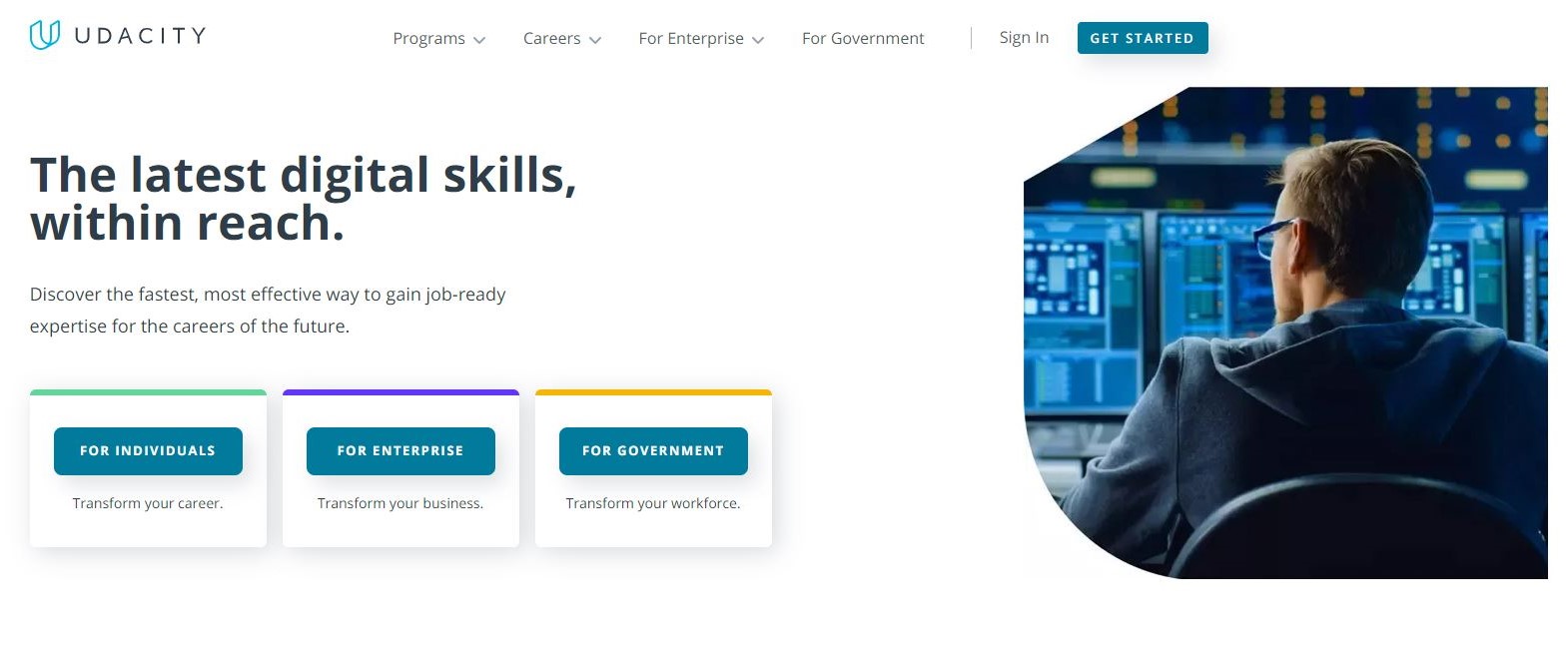TechRadar Verdict
Udacity offers online educational content with its nanodegrees that focus on computer and business content. The strength is in its reviewers providing strong feedback to guide learning but some folks complain about the high price.
Pros
- +
Discounts available
- +
Reviewer feedback
- +
Nanodegrees
- +
Educational partnerships
Cons
- -
Expensive
- -
Limited support options
- -
Few plans available
- -
Lacks smartphone apps
Why you can trust TechRadar
Udacity grew from an experiment in online digital learning. Two Stanford University instructors, Sebastian Thrun and Peter Norvig decided to offer an online course for “Introduction to Artificial Intelligence” on a free basis for anyone. The response exceeded expectations, with more than 160,000 learners across 190 countries. Spurred by this initial success, Udacity then decided to “Democratize education” and over time made the decision to focus the effort on “Mastery of in demand education.”
- Interested in Udacity? Check out the website here
Currently, Udacity counts over 100k graduates, with over 100 Enterprise customers worldwide, and over 200 industry experts helping to create the content. Udacity has partnered with tech companies including Amazon Web Services, Google, and IBM.
- Also check out our roundup of the best online courses
Features
Udacity starts with the bold claim to “Get the skills you need for a $100k+ tech career in just 3 months,” which sounds like a pretty good deal. After all, folks go to an in person college for four years, and are often not compensated as highly. The courses of study are quite business and tech heavy, with areas such as Data Science, Artificial Intelligence and Cloud Computing.
There is significant support claimed, as Udacity indicates that it has over 1,400 mentors available to help. Additionally, they are available on a 24/7 basis. Furthermore, to unblock learning, the goal is to provide this support on an impressive 1 hour turnaround time. These mentors are “Highly vetted,” as each has to complete not only the nanodegree in the respective area, but also they go through a 5-step hiring process. The mentors review each project submission on a line by line basis, for comparison and to provide feedback to the learner. Overall, Udacity indicates that its reviewers have given their critique to its learners on approximately 2.7 million projects, and have an average rating that is a high 88 out of 100 points. Reviewers provide feedback that is personalized, feedback loops to provide the critique, use industry best practices to give tips to the learner, and also provide additional resources for even more improvement.
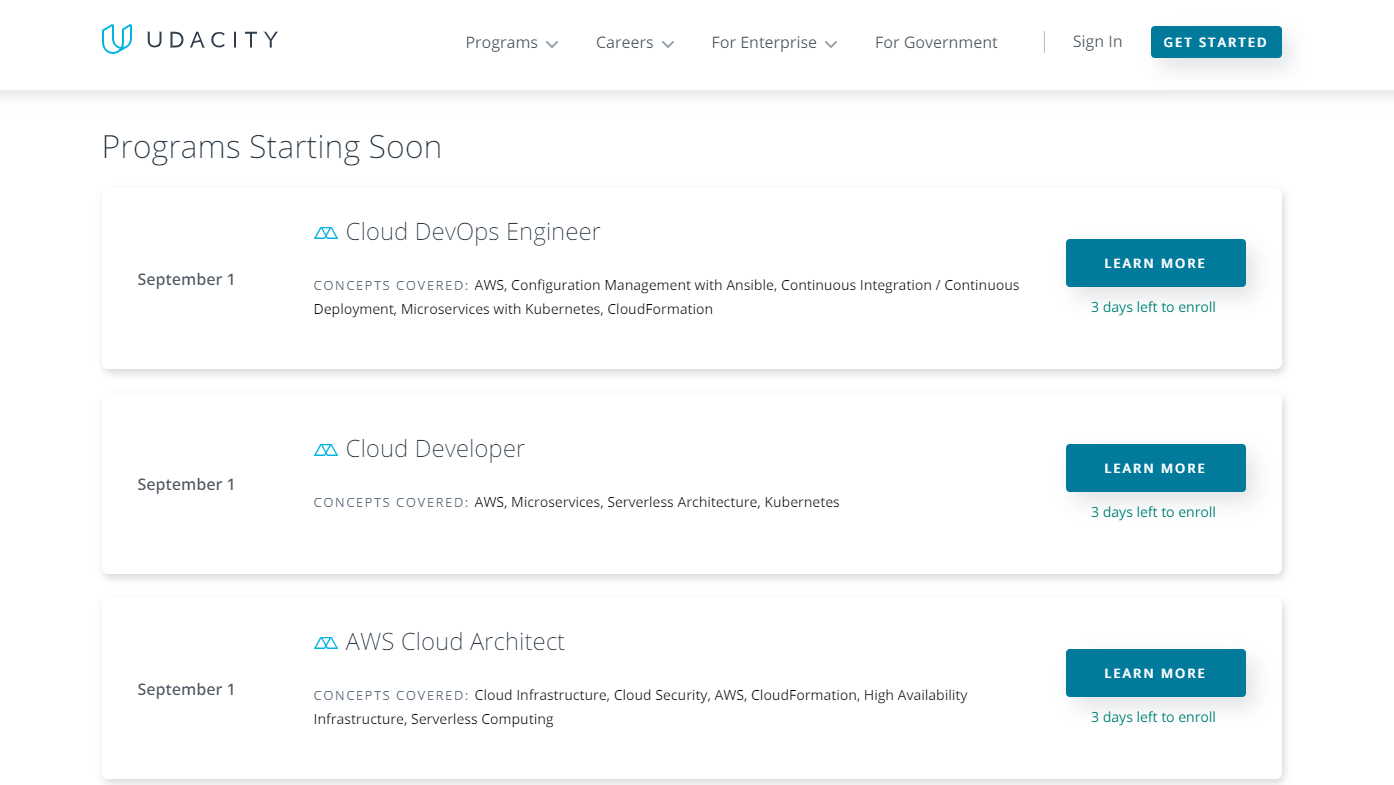
To get a better feel for the process we created an account, and looked at the course catalog. We went into the School of Cybersecurity area, and found courses, and as in any college catalog that were laid out by Beginner (“Introduction to Cybersecurity”), Intermediate (“Security Analyst”) and Advanced (“Ethical Hacker”) categories. We then went into an intermediate course, which is the nanodegree program for a Security Engineer. To help with a decision on the course, we liked the ‘Download Syllabus,’ which provides a detailed overview of the course, including the final project.
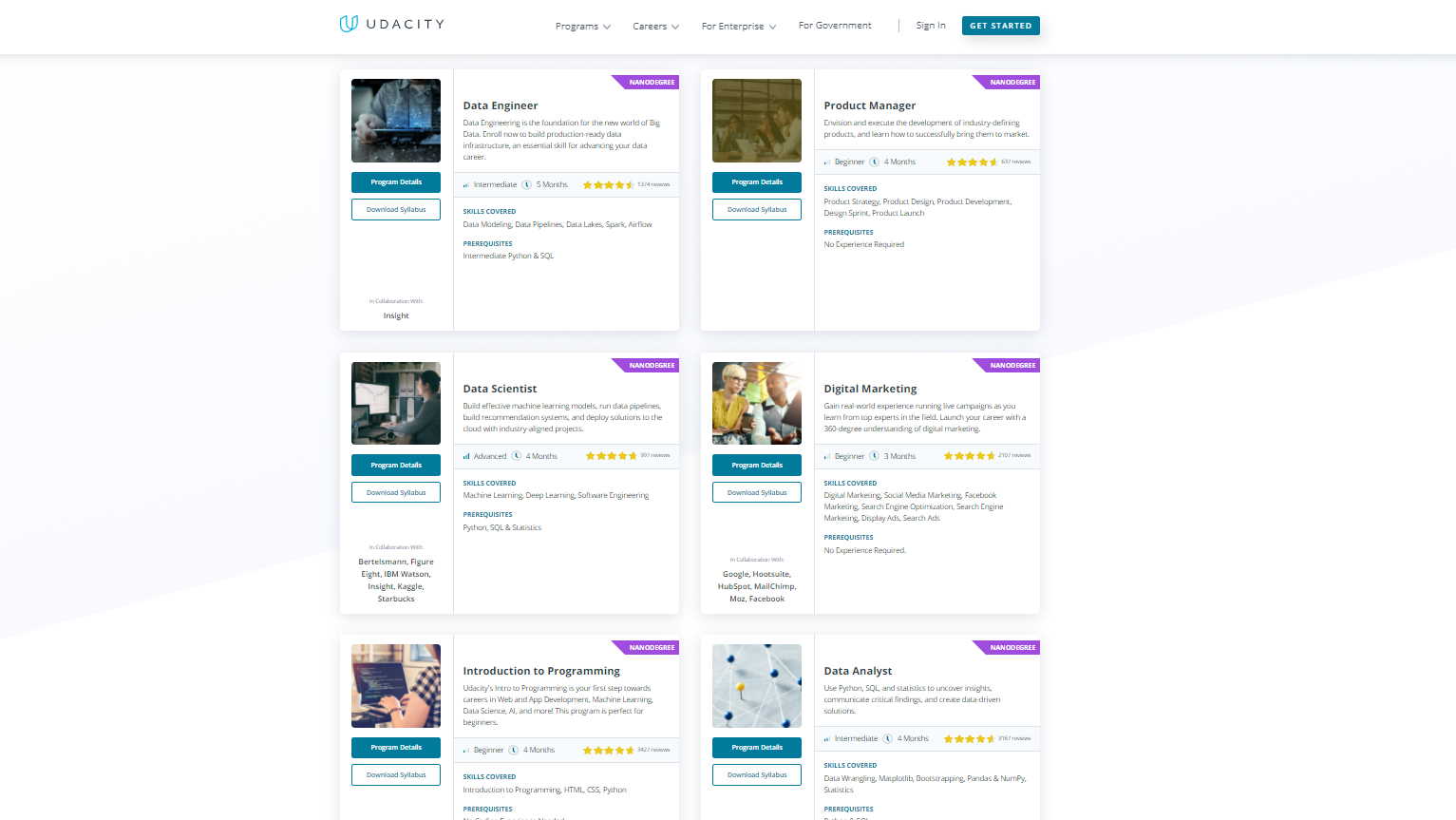
Plans
While some competitors offer a range of tiered plans for learners, Udacity is far more limiting for individual learners. Rather than offering individual courses, certificate tracks, and different types of degrees, Udacity terms its offerings ‘Nanodegrees,’ somewhat between a certificate program and a more formal online degree.
Udacity also is one of the more expensive options, with the Nanodegrees we reviewed all coming in at a lofty $399 per month. However, on at least some of these pathways, there is the option to prepay for 3 months at once, which would net a 15% discount. However, we would have liked to see an option to prepay for the course until completion, rather than being time limited.
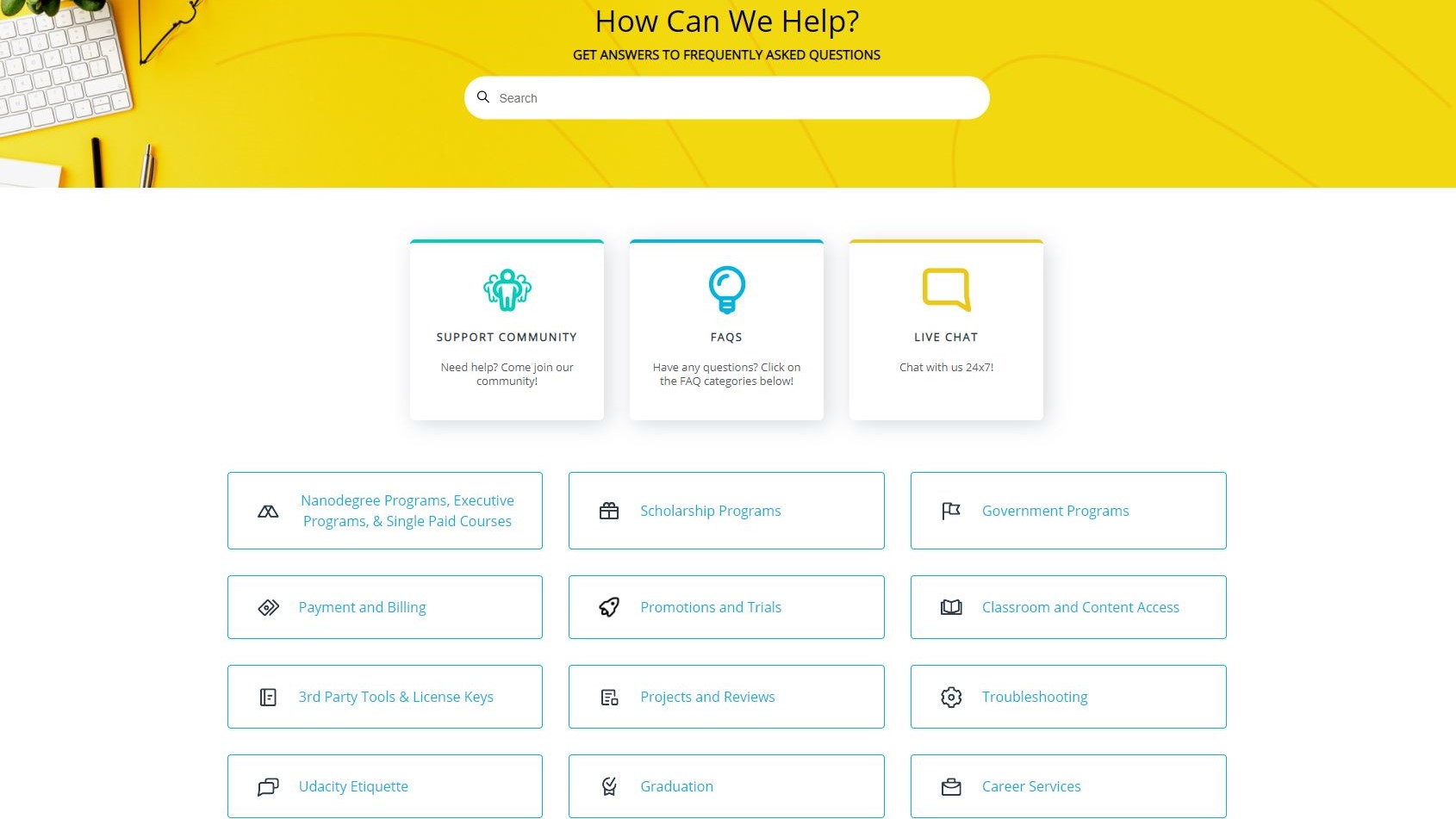
Support
Udacity has support available via its “Contact Us” page. Here, things get divided into three categories: a FAQ, Content Questions, and Everything Else. The FAQ has predone and fast answers, along with a support community, and live chat that is available on a 24/7 basis. The Content Questions requires an account to be created to go further. Under Everything Else, is essentially a support portal to submit a query, which gets categorized to get routed to the correct team.
A number of contact options are not present, such as a phone number for direct human contact, let alone a toll free number or fax number. We also did not find any support videos, ebooks, or even a simple direct email which are notable omissions.
User reviews
Udacity previously had smartphone apps and decided to remove them for both iOS and Android back in 2019. We find this fairly annoying at a time when so much content is migrating to the mobile space. As such, there are no user reviews of these apps.
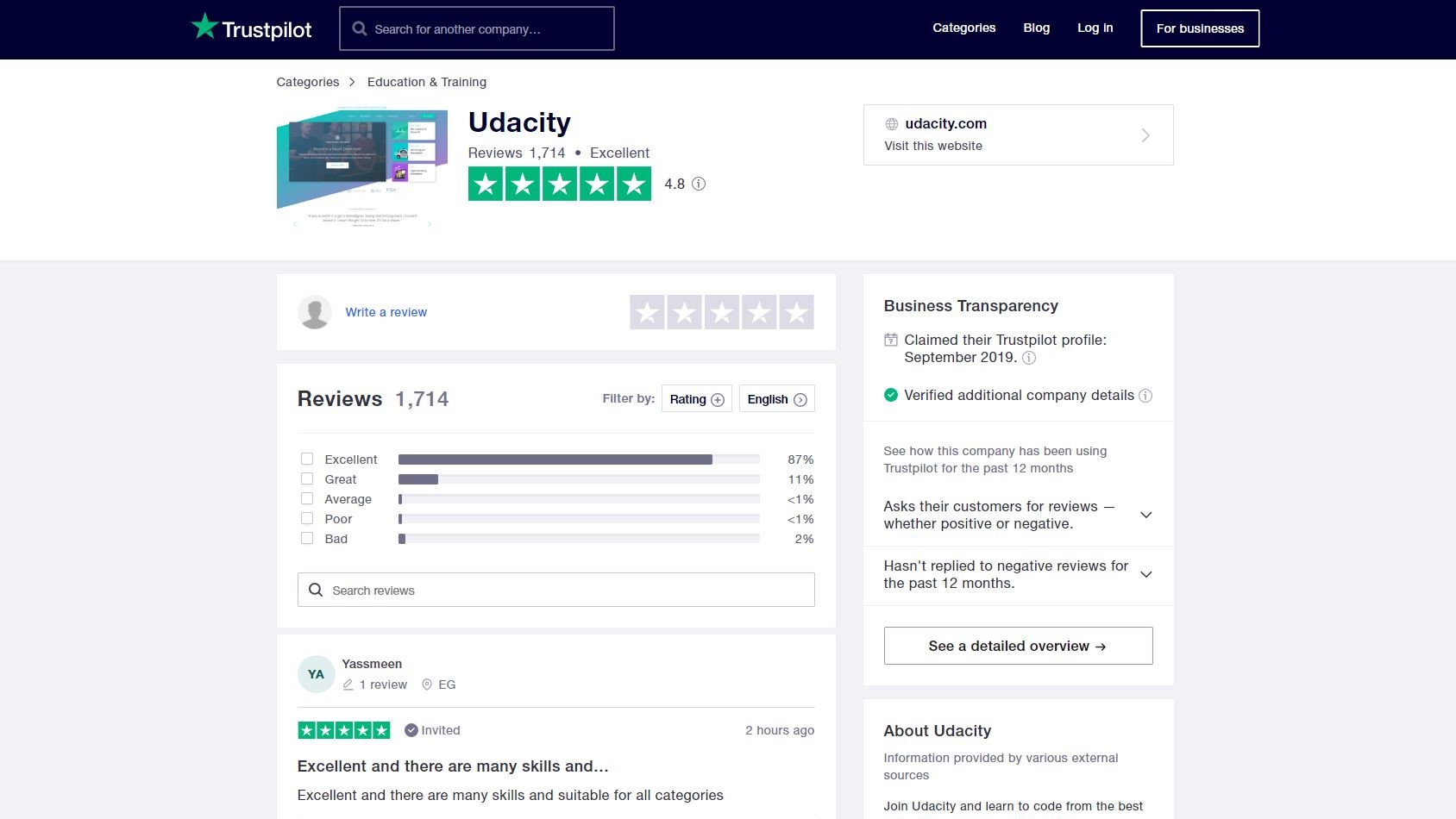
The reviews we did find online are really hit or miss, although numerically Udacity gets high marks with TrustPilot giving it 4.8 out of 5 stars, and Facebook and even higher 4.9/5 stars. Some learners indicate the power of this platform, and the ease of gaining practical knowledge. There are frequent complaints about the high cost. Others point out that the projects done in the course are not relevant to the course material, and the reviewers' critiques are hit or miss. Some finally take issue with the entire course, complain about the amount they learned, and did little with the knowledge they did gain. Finally, there are some complaints about the support options, as when there is a complicated issue that needs attention for resolution, users have issues in directly communicating (which we can predict from the available support options above).
Final verdict
Udacity provides an online learning platform for acquiring a new skill with its nanodegrees. The pros include the practical education, the robust reviews, and the detailed syllabus to help to decide to pursue the education. The cons cover the expensive price (although some discounts are available), the lack of support options, and the missing smartphone apps. While we like the choice of courses, realize that there are more affordable options out there to pursue.
- We've also featured the best online learning platforms
Jonas P. DeMuro is a freelance reviewer covering wireless networking hardware.
